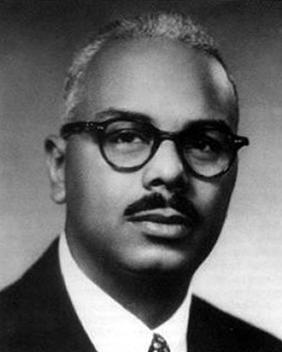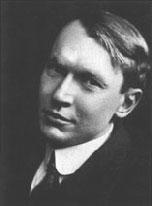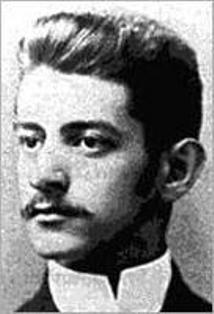
David Mamet
Born: November 30, 1947 in Flossmoor, Illinois
Pen Name: None Connection to Illinois: Mamet was born and raised in Flossmoor. Biography: David Mamet is an American author, essayist, playwright, screenwriter and film director. His works are known for their clever, terse, sometimes vulgar dialogue and arcane stylized phrasing, as well as for his exploration of masculinity. He was educated at Goddard College in Vermont where he later taught. He is a founding member of the St. Nicholas Players Theater Company in 1974 and has written screen adaptations of several of his plays.Mamet's first produced screenplay was the 1981 production of ''The Postman Always Rings Twice'' (directed by Bob Rafelson), based upon James M. Cain's novel. As a screenwriter, he received Oscar nominations for ''The Verdict'' (1982) and ''Wag the Dog'' (1997). He wrote the screenplays for such films as ''The Verdict'', ''The Untouchables'' and ''Wag the Dog'', and has twice been nominated for an Academy Award. He has written and directed ten films, including ''Homicide'', ''The Spanish Prisoner'', ''State and Main'', ''House of Games'', ''Spartan'' and ''Redbelt''. His numerous plays include Oleanna, ''Glengarry Glen Ross'' (winner of the Pulitzer Prize and the New York Drama Critics' Circle Award), ''American Buffalo'', ''Speed-the-Plow'', ''Boston Marriage'', ''November, Race'' and ''The Anarchist''. As a playwright, he received Tony nominations for ''Glengarry Glen Ross'' (1984) and ''Speed-the-Plow'' (1988). His HBO film Phil Spector, starring Al Pacino and Helen Mirren, aired in 2013 and earned him two Emmy Award nominations for Outstanding Writing and Outstanding Directing. He was co-creator and executive producer of the CBS television show The Unit.
Awards:
Selected Titles
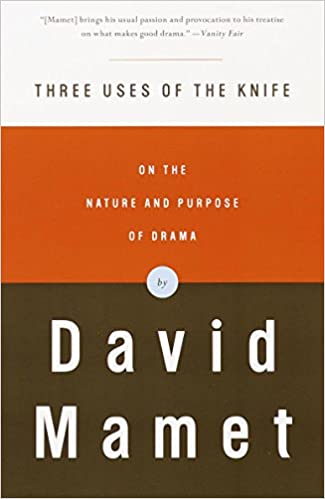 |
3 uses of the knife : ISBN: 037570423x OCLC: 44039485 Vintage Books, New York : 2000. What makes good drama? And why does drama matter in an age that is awash in information and entertainment? With bracing directness and aphoristic grace, the Pulitzer Prize-winning playwright of Glengarry Glen Ross delivers a thrillingly original treatise on his art. To David Mamet, human beings are drama-creating animals who impose narrative structures on everything from today's weather to next year's elections. Mamet distinguishes true drama from its false variants, unravels the infamous Second-Act Problem, and considers the mysterious persistence of the soliloquy. Three Uses of the Knife is an inspired guide for any playwright or theatergoer that doubles as a trenchant work of moral and aesthetic philosophy. - Publisher. |
 |
American buffalo : ISBN: 0802150578 OCLC: 3386971 Grove Press, New York : 1977, ©1976. Two neighborhood punks and the owner of a junk shop plot to burglarize a coin collector's apartment. They fail because of inertia, ineptitude and mutual distrust, but remain bound together by their helpless frustration. 2 acts, 3 men, 1 interior. |
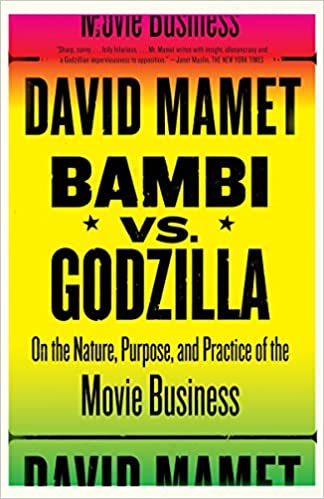 |
Bambi Vs. Godzilla : ISBN: 1400034442 OCLC: 219696018 Vintage, New York : 2008. Playwright and screenwriter Mamet gives us a subversive inside look at Hollywood from the perspective of a filmmaker who has always played the game his own way. Who really reads the scripts at the film studios? How is a screenplay like a personals ad? Whose opinion matters when revising a screenplay? Why are there so many producers listed in movie credits? And what do those producers do, anyway? Refreshingly unafraid to offend, Mamet provides hilarious, surprising, and bracingly forthright answers to these and other questions about virtually every aspect of filmmaking, from concept to script to screen. He covers topics ranging from "How Scripts Got So Bad" to the oxymoron of "Manners in Hollywood." He takes us step-by-step through some of his favorite movie stunts and directorial tricks, and demonstrates that it is craft and crew, not stars and producers, that make great films.--From publisher description. |
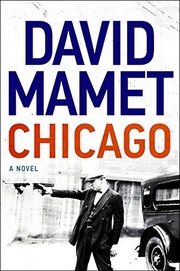 |
Chicago : ISBN: 9780062797193 OCLC: 1006524789 A big-shouldered, big-trouble thriller set in mobbed-up 1920s Chicago--a city where some people knew too much, and where everyone should have known better--by the Oscar-nominated screenwriter of The Untouchables and Pulitzer Prize-winning playwright of Glengarry Glen Ross. Mike Hodge--veteran of the Great War, big shot of the Chicago Tribune, medium fry--probably shouldn't have fallen in love with Annie Walsh. Then, again, maybe the man who killed Annie Walsh have known better than to trifle with Mike Hodge. In Chicago, David Mamet has created a bracing, kaleidoscopic page-turner that roars through the Windy City's underground on its way to a thunderclap of a conclusion. Here is not only his first novel in more than two decades, but the book he has been building to for his whole career. Mixing some of his most brilliant fictional creations with actual figures of the era, suffused with trademark Mamet Speak, richness of voice, pace, and brio, and exploring--as no other writer can--questions of honor, deceit, revenge, and devotion, Chicago is that rarest of literary creations: a book that combines spectacular elegance of craft with a kinetic wallop as fierce as the February wind gusting off Lake Michigan-- |
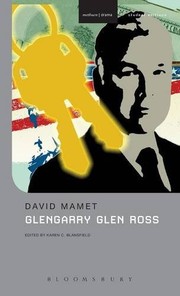 |
Glengarry glen ross. ISBN: 1474261310 OCLC: 921988184 |
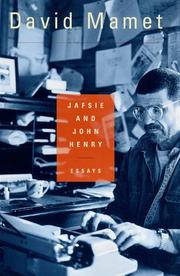 |
Jafsie and John Henry : ISBN: 0684841207 OCLC: 40193756 Free Press, New York : ©1999. David Mamet has said that if he hadn't found a life in the theater, it is very likely he would have become a criminal. In Jafsie and John Henry the master improviser takes on a range of roles and personae in a lively and personal way. Mamet in this diverse collection turns his unique lens on subjects ranging from houses to Hollywood producers. As the writer turns fifty, he not only shares his reflections on the nature of creativity and the challenges and rewards of aging but delves into his most intimate obsessions. From a description of the labyrinthine psychology of poker to sharp sallies on moviemaking gibberish and the meaning of macho, Jafsie and John Henry is knit together by Mamet's unique perspective and inimitably spare wit. The perennial outsider, David Mamet gives us an inside look at the unique world of an American icon and an unromantic perspective on the changing nature of creativity in an artist's life. |
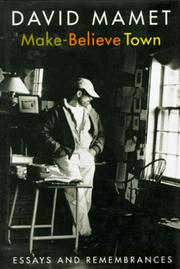 |
Make-believe town : ISBN: 0316543403 OCLC: 33983260 Little, Brown, Boston : 1996. Make-Believe Town brings together David Mamet's acute insights into everyday life, the arts, and politics. These pieces evidence Mamet's love of language, particularly the introductory essay, Eight Kings, which celebrates the private languages of carpenters, carnival workers, and all crafts and trades, and The Northern Novel, which propounds Mamet's affection for the line of American fiction exemplified by Willa Cather and Theodore Dreiser. Some of the essays are prose portraits from Mamet's life: Deer Hunting and The Diner delineate worlds far from the public eye. Make-Believe Town also contains beautifully written recollections of Mamet's early days as a writer (Girl Copy), his start in the theater (Memories of Off Broadway), his education as a gambler (Gems From a Gambler's Bookshelf), and bygone days on Broadway (Delsomma's). |
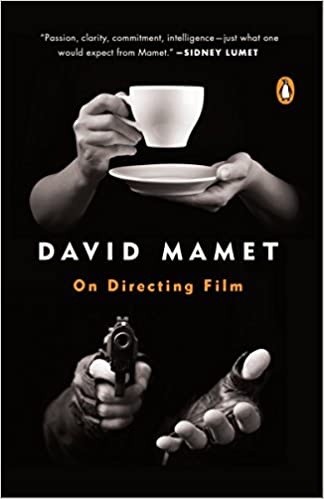 |
On directing film / ISBN: 0140127224 OCLC: 30437682 According to David Mamet, a film director must, above all things, think visually. Most of this instructive and funny book is written in dialogue form and based on film classes Mamet taught at Columbia University. He encourages his students to tell their stories not with words, but through the juxtaposition of uninflected images. The best films, Mamet argues, are composed of simple shots. The great filmmaker understands that the burden of cinematic storytelling lies less in the individual shot than in the collective meaning that shots convey when they are edited together. Mamet borrows many of his ideas about directing, writing, and acting from Russian masters such as Konstantin Stanislavsky, Sergei M. Eisenstein, and Vsevelod Pudovkin, but he presents his material in so delightful and lively a fashion that he revitalizes it for the contemporary reader. |
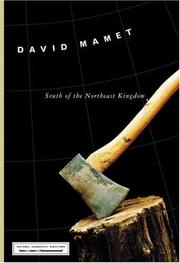 |
South of the Northeast Kingdom / ISBN: 0792269608 OCLC: 50004893 National Geographic, Washington, D.C. : ©2002. The author describes his love for Vermont, sharing his thoughts on the history of the region, the reason for the state's live and let live attitude, and how Vermont's free-thinking traditions can survive in the modern world. |
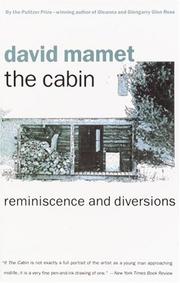 |
The cabin : ISBN: 0679747206 OCLC: 27896466 Vintage Books, New York : 1993. |
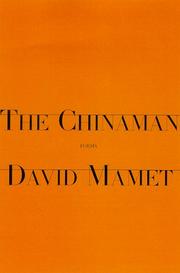 |
The Chinaman / ISBN: 0879518979 OCLC: 40142913 Overlook Press, Woodstock, N.Y. : 1999. The Chinaman contains 40 poems, most of which are published here for the very first time. Mamet presents a wide range of moods - from the bleak landscapes of "The Triumph of Gravity" and "Tremont Street" to the deceptive playfulness of "This and That"--And a wide range of characters - from the loving muse of "R." to the memorable outsiders of "Song of the Jew" and the title poem. What unites this collection is Mamet's mastery of form: all are written with the raw energy and explosive language that is his trademark. |
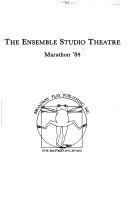 |
The Ensemble Studio Theatre marathon '84. ISBN: 0881450308 OCLC: 13247410 Broadway Play Pub., New York : 1985. |
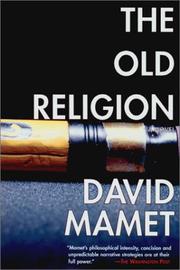 |
The old religion / ISBN: 1585671908 OCLC: 50016624 Overlook Press, Woodstock, NY : ©1997. A Jew in 1915 Atlanta is falsely accused of raping and murdering a woman employee of his factory and pays for it with his life. Based on real events, the novel looks at the precarious position of Jews in Christian society. |
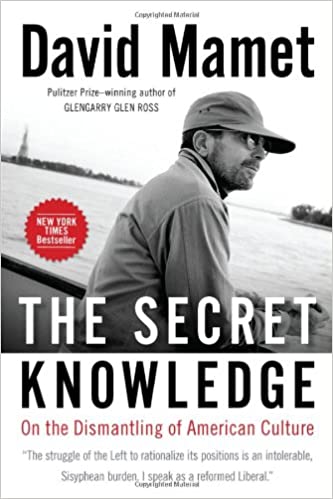 |
The secret knowledge : ISBN: 1595230971 OCLC: 824132150 For the past thirty years, David Mamet has been a controversial and defining force in theater and film, championing the most cherished liberal values. In some of the great movies and plays of our time, his characters have explored the ethics of the business world, embodied the struggles of the oppressed, and faced the flaws of the capitalist system. But in recent years Mamet has had a change of heart. He realized that the so-called main-stream media outlets were irredeemably biased, peddling a hypocritical, suborned, and deeply flawed worldview. Now he employs his trademark intellectual force and vigor to take on all the key political and cultural issues of our times, from religion to political correctness to global warming. -- Back cover. |
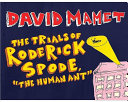 |
The trials of Roderick Spode : ISBN: 9781402238307 OCLC: 466361543 Sourcebooks, Naperville, IIl. : ©2010. Follows the adventures of the human ant, Roderick Spode, as he hangs out with his friend Cocky Cockroach, encounters Chaos the turtle, and fights his nemesis. |
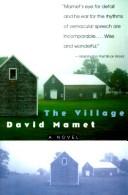 |
The village : ISBN: 0316543381 OCLC: 29845011 Little, Brown, Boston : ©1994. A very ordinary village in New England where nothing happens--in the street, that is, because inside people's heads action abounds, be that the hardware man on the verge of bankruptcy, or the hunter yearning for the good old days, or the local bimbo filled with sadistic fantasies. A study of characters and their interplay by the playwright who wrote American Buffalo. |
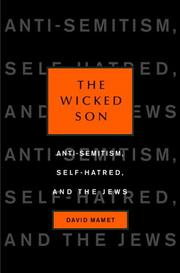 |
The wicked son : ISBN: 0805242074 OCLC: 64689003 Nextbook : New York : 2006. "To the wicked son, who asks "What does all this mean to you?" To the Jews who, in the sixties, envied the Black Power Movement; who, in the nineties, envied the Palestinians; who weep at Exodus but jeer at the Israeli Defense Forces; who nod when Tevye praises tradition but fidget through the seder; who might take their curiosity to a dogfight, to a bordello or an opium den but find ludicrous the notion of a visit to the synagogue; whose favorite Jew is Anne Frank and whose second-favorite does not exist; who are humble in their desire to learn about Kwanzaa and proud of their ignorance of Tu Bi'Shvat; who dread endogamy more than incest; who bow the head reverently at a baptism and have never attended a bris-to you, who find your religion and race repulsive, your ignorance of your history a satisfaction, here is a book from your brother. Book jacket."--Jacket. |
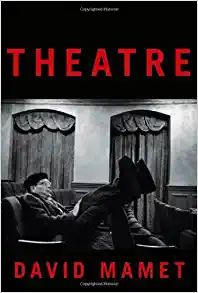 |
Theatre / ISBN: 086547947X OCLC: 650212692 Faber and Faber, New York : 2011. If theatre were a religion, explains David Mamet in his opening chapter, "many of the observations and suggestions in this book might be heretical." As always, Mamet delivers on his promise: in Theatre, the acclaimed author of Glengarry Glen Ross and Speed the Plow calls for nothing less than the death of the director and the end of acting theory. For Mamet, either actors are good or they are non-actors, and good actors generally work best without the interference of a director, however well-intentioned. Issue plays, political correctness, method actors, impossible directions, Stanislavksy, and elitists all fall under Mamet's critical gaze. To students, teachers, and directors who crave a blast of fresh air in a world that can be insular and fearful of change, Theatre throws down a gauntlet that challenges everyone to do better, including Mamet himself. |
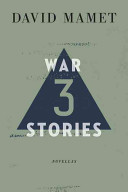 |
Three war stories / ISBN: 0786755601 OCLC: 858602731 Spanning centuries and continents, Mamet uses war and its players to explore, among other themes, redemption and forgiveness as they unfold in the context of conflict in the form of three novellas. In "The Redwing," the first of the three novellas, a 19th Century Secret Service naval officer turned prisoner, then novelist and finally memoirist recounts his own transformations during the course of his service and imprisonment. The protagonist in "Notes on Plain Warfare" examines religion through the prism of the American Indian wars. Finally, "The Handle and the Hold" is a vivid, dialogue-driven tale of two ex-military men who steal a plane in the month before the Israeli War of Independence. Finely wrought, Mamet eloquently depicts the psychological brutality conflict raises in the landscape of the mind. |
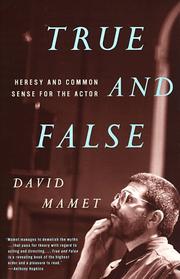 |
True and false : ISBN: 0679772642 OCLC: 41028104 Vintage Books, New York : 1999. The Pulitzer Prize-winning playwright, director, and teacher presents a blunt, irreverent, unsparingly honest guide to acting that overturns conventional truths and tells aspiring actors what they really need to know. David Mamet leaves no acting tenet untouched: how to judge the role, approach the part, and work with the playwright, how to concentrate and think about the scene, how to avoid becoming the paint-by-numbers mechanical actor, the "How'm I doing?" ham actor, the over-the-top "Hollywood Huff" actor, the right way to undertake auditions and rehearsals, the proper approach to agents, to individual jobs, and to the business in general and the question of talent. |
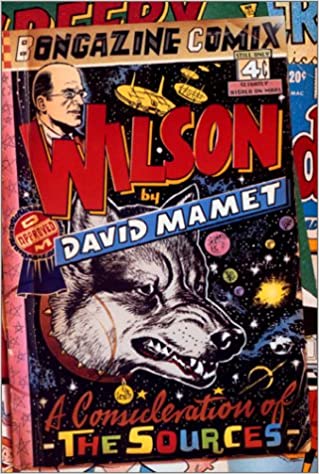 |
Wilson : ISBN: 0571201873 OCLC: 43632864 Faber and Faber, London : 2000. When the Internet--and the collective memory of the 21st century--crashes, the past is reassembled from the downloaded memories of Ginger, wife of ex-President Wilson. The transcripts take the reader on an intellectually breathtaking tour. In Mamet's baroque, fragmented world, nothing is certain except the certainty of academics. In playing with the ideas of perception, understanding, and accuracy, he dares to doubt them all. When truth is quicksand, the gag becomes a lifeline of stoic nobility. After the Cola riots, the fire at the Stop n' Shop, and the death of my kitten, what remains? Can any sense be made of the texts found in the capsule or stuffed in the airlock? Does the Joke Code still operate? Has anyone seen my copy of Bongazine? Who were the members of the Bootsie club? Does the Toll Hound dance? What was the meaning of the message written in Mrs. Wilson's urine? Can Jane of Trent unlock this paranoia? What were Chet and Donna doing in the boathouse? And just who does Ginger think she is?--goodreads.com. |
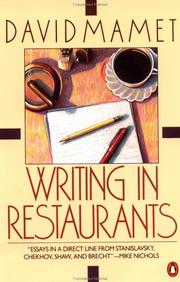 |
Writing in restaurants / ISBN: 0140089810 OCLC: 15589161 Penguin Books, New York, N.Y. : 1987, ©1986. Temporarily putting aside his role as playwright, director, and screenwriter, David Mamet digs deep and delivers thirty outrageously diverse vignettes. On subjects ranging from the vanishing American pool hall, family vacations, and the art of being a bitch, to the role of today's actors, his celebrated contemporaries and predecessors, and his undying commitment to the theater, David Mamet's concise style, lean dialogue, and gut-wrenching honesty give us a unique view of the world as he sees it. |


